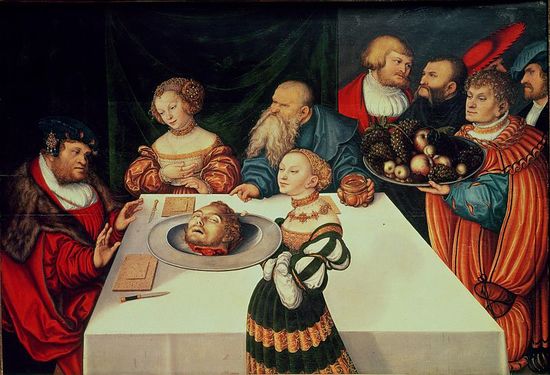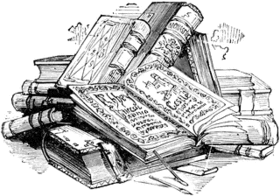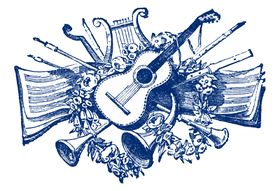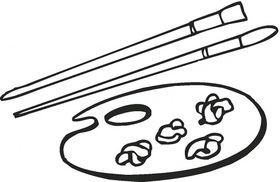Difference between revisions of "Category:Herodias (subject)"
| (2 intermediate revisions by the same user not shown) | |||
| Line 9: | Line 9: | ||
|logo= Logo.png | |logo= Logo.png | ||
|px= 38 | |px= 38 | ||
|content= [[File:Banquet Herod Cranach.jpg| | |content= [[File:Banquet Herod Cranach.jpg|550px]] | ||
| Line 72: | Line 72: | ||
Ant -- Herodias... was married to Herod (Boethus), the son of Herod the Great, who was born of Mariamne II, the daughter of Simon the high priest, who had a daughter, Salome; after whose birth Herodias took upon her to confound the laws of our country, and divorced herself from her husband while he was alive, and was married to Herod (Antipas), her husband's brother by the father's side, he was tetrarch of Galilee; but her daughter Salome was married to (Herod) Philip, the son of Herod (the Great), and tetrarch of Trachonitis; and as he died childless, Aristobulus (of Chalcis), the son of Herod (of Chalcis), the brother of (Herod) Agrippa I, married her; they had three sons, Herod, Agrippa, and Aristobulus. | Ant -- Herodias... was married to Herod (Boethus), the son of Herod the Great, who was born of Mariamne II, the daughter of Simon the high priest, who had a daughter, Salome; after whose birth Herodias took upon her to confound the laws of our country, and divorced herself from her husband while he was alive, and was married to Herod (Antipas), her husband's brother by the father's side, he was tetrarch of Galilee; but her daughter Salome was married to (Herod) Philip, the son of Herod (the Great), and tetrarch of Trachonitis; and as he died childless, Aristobulus (of Chalcis), the son of Herod (of Chalcis), the brother of (Herod) Agrippa I, married her; they had three sons, Herod, Agrippa, and Aristobulus. | ||
====Gospel of Mark==== | |||
Herod himself had sent men who arrested John, bound him, and put him in prison on account of Herodias, his brother Philip's wife, because Herod had married her. 18 For John had been telling Herod, "It is not lawful for you to have your brother's wife." 19 And Herodias had a grudge against him, and wanted to kill him. But she could not, 20 for Herod feared John, knowing that he was a righteous and holy man, and he protected him. When he heard him, he was greatly perplexed; and yet he liked to listen to him. 21 But an opportunity came when Herod on his birthday gave a banquet for his courtiers and officers and for the leaders of Galilee. 22 When his daughter Herodias came in and danced, she pleased Herod and his guests; and the king said to the girl, "Ask me for whatever you wish, and I will give it." 23 And he solemnly swore to her, "Whatever you ask me, I will give you, even half of my kingdom." 24 She went out and said to her mother, "What should I ask for?" She replied, "The head of John the baptizer." 25 Immediately she rushed back to the king and requested, "I want you to give me at once the head of John the Baptist on a platter." 26 The king was deeply grieved; yet out of regard for his oaths and for the guests, he did not want to refuse her. 27 Immediately the king sent a soldier of the guard with orders to bring John's head. He went and beheaded him in the prison, 28 brought his head on a platter, and gave it to the girl. Then the girl gave it to her mother. | |||
}} | }} | ||
Latest revision as of 05:36, 14 February 2018
|
Herodias (Home Page)
< Events : Death of John the Baptist > < Scholarship : Herodias (research) -- Herodias (sources) > < Fiction : Herodias (art) -- Herodias (literature) -- Herodias (cinema) -- Herodias (music) >
Herodias -- Overview Josephus introduces Herodias as the daughter of Aristobulus IV and Berenice I. Her paternal grandparents were Herod the Great and Mariamne, while Salome I and Costobarus were her maternal grandparents. She was thus related to both the House of Herod and the House of Hasmoneus. Her siblings were Herod Agrippa I, Herod of Chalcis, Mariamne III and Aristobulus Minor. Herodias married her uncle Herod II, one of the sons of Herod the Great. The couple lived in Rome and had a daughter, Salome. When Herod Antipas (the half-brother of her husband) fell in love with her during a visit to Rome, she accepted his love and agreed to divorce from Herod II. This created some political turmoil as Herod Antipas was married with Phasaelis, the daughter of King Aretas IV of Nabatea, and divorced her, and widespread religious discontent as Herodias] married her husband's brother without being a widow. Josephus' account of the death of John the Baptist mentions his criticism of Herod's marriage as the cause of his imprisonment but does not give Herodias any role. Christian sources instead blame her more than her husband. According to Mark and Matthew, the opportunity to have John killed came when Herod Antipas on his birthday gave a banquet. Herodias instigated her daughter (Salome) to ask for the head of John the Baptist as her reward for dancing before her uncle (and now step-father) Herod Antipas. According to Josephus, in 39 CE Herodias convinced her husband to plot against her brother Herod Agrippa I, but Agrippa in return accused Herod Antipas of conspiracy and had him exiled in Lyon, Gaul. As the sister of the winning party, Herodias was offered the possibility to remain in Judea, but proudly decided to follow her husband into exile.
From the historical point of view, Herodias is part of the scion of powerful and politically engaged women that characterized the House of Hasmoneus and the House of Herod, from Queen Salome Alexandra to Alexandra the Hasmonean, Salome I, Mariamne, Berenice, and others. Research on Herodias however is limited by the paucity of historical sources and by the legendary nature of the Gospel account. Scholars have rather focused on the study of the Herodias-Salome legend and its ramifications in literature and the arts. See Salome (research) Related categoriesExternal links
The character of Herodias is mentioned both in the Gospels (Mark and Matthew) and in Josephus. In all sources Herodias is presented as a proud and independent woman, capable of influencing and even manipulating her husband(s). Flavius JosephusAnt -- Herodias... was married to Herod (Boethus), the son of Herod the Great, who was born of Mariamne II, the daughter of Simon the high priest, who had a daughter, Salome; after whose birth Herodias took upon her to confound the laws of our country, and divorced herself from her husband while he was alive, and was married to Herod (Antipas), her husband's brother by the father's side, he was tetrarch of Galilee; but her daughter Salome was married to (Herod) Philip, the son of Herod (the Great), and tetrarch of Trachonitis; and as he died childless, Aristobulus (of Chalcis), the son of Herod (of Chalcis), the brother of (Herod) Agrippa I, married her; they had three sons, Herod, Agrippa, and Aristobulus. Gospel of MarkHerod himself had sent men who arrested John, bound him, and put him in prison on account of Herodias, his brother Philip's wife, because Herod had married her. 18 For John had been telling Herod, "It is not lawful for you to have your brother's wife." 19 And Herodias had a grudge against him, and wanted to kill him. But she could not, 20 for Herod feared John, knowing that he was a righteous and holy man, and he protected him. When he heard him, he was greatly perplexed; and yet he liked to listen to him. 21 But an opportunity came when Herod on his birthday gave a banquet for his courtiers and officers and for the leaders of Galilee. 22 When his daughter Herodias came in and danced, she pleased Herod and his guests; and the king said to the girl, "Ask me for whatever you wish, and I will give it." 23 And he solemnly swore to her, "Whatever you ask me, I will give you, even half of my kingdom." 24 She went out and said to her mother, "What should I ask for?" She replied, "The head of John the baptizer." 25 Immediately she rushed back to the king and requested, "I want you to give me at once the head of John the Baptist on a platter." 26 The king was deeply grieved; yet out of regard for his oaths and for the guests, he did not want to refuse her. 27 Immediately the king sent a soldier of the guard with orders to bring John's head. He went and beheaded him in the prison, 28 brought his head on a platter, and gave it to the girl. Then the girl gave it to her mother.
|
Herodias was the original villain in the story of the Death of John the Baptist, and as such she was presented in Christian iconography. She was the one who plotted to have John the Baptist killed and cunningly used his daughter Salome to reach her goal. The interest in the character began to grow in the 19th century. She was now the undisputed protagonist of the story, and her motivations were scrutinized, from revenge to jealousy to rejected love. It was to her that the infamous kiss to the head of the dead John the Baptist was first attributed by Heine. Gradually however her role was overshadowed by her daughter, Salome, who proved to be more suitable to such metamorphosis into an unstoppable femme fatale and much more credible in the role of seductress. By the beginning of the 20th century, Salome had replaced her mother as the villain of the story and condemned Herodias to a marginal and obscure role. Gabriele Boccaccini, University of Michigan
|
Pages in category "Herodias (subject)"
The following 11 pages are in this category, out of 11 total.
1
- L'Erodiade; ovvero, La morte di S. Giovanni Battista (Herodias; or, The Death of St. John the Baptist / 1687 Legrenzi / Neri), oratorio
- Erodiade (Herodias / 1832 Pellico), play
- Erodiade (Herodias / 1838 Liberali / De Horatiis), oratorio
- Atta Troll (1843 Heine), poetry
- Hérodias (1877 Flaubert), novel
- Hérodiade (Herodias / 1881 Massenet / Milliet, Grémont), opera & libretto
- Herodes a Herodias (Herod and Herodias / 1909 Hviezdoslav), play (Slovak)
- Hérodiade (Herodias / 1910 Jasset, Hatot), short film
- Herod (1912 Frenkel), short film
- Erodiade (Herodias / 1969 Testori), play




